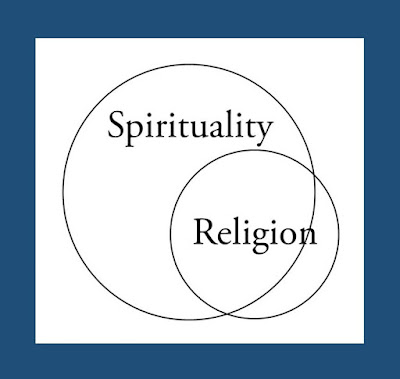The Intersection of Spirituality and Religion
My experience of falling away from formal Zen practice can’t be all that unique. The factors that precipitated my estrangement may have been different. And maybe my Zen practice since “the path disappeared beneath my feet” looks different than that of many others. But Zen practitioners can’t be immune from the experience of “losing one’s faith,” can they? So I write these words with at least some degree of confidence that they’ll resonate with others; not necessarily with those who know me, or even those fellow practitioners who lived through the very same spiritual turmoil as I, but with some.
You see, some of my erstwhile fellow practitioners took up formal practice with other Zen teachers in fairly short order. Others diligently set about creating a new place of formal Zen practice to take the place of the old one. I even labored with them for a time on that endeavor, departing just as the bylaws of that new practice community were formally voted into being. I suppose I just wasn’t ready to get married again so soon! But why? Why did the path disappear beneath my feet, but not those of many others? Why was my faith in formal Zen practice so shaken, whereas others might have even had theirs strengthened? I realize now that the answer lies in the relationship between spirituality and religion, a topic that I began researching and writing about over a decade ago.

Intersecting spheres of spirituality and religion
In its most general sense, spirituality is that which we manifest simply by virtue of being alive. The root word, spirit, is derived from the Latin, spiritus, relating to the breath, soul, or life animating the materiality of the body. Spirit has also come to refer to that which is unique to our being – our energy, will, or determination, for instance. When we speak of spirituality, however, we most often think in terms of that which we value most. What do we find beautiful? What do we love? What brings us joy? What makes life worth living? Spirituality begins to sound a lot like religion, however, when conversation turns from that which makes life worth living to that which we believe.
The primary difference between the two is that, whereas spirituality arises from within each individual, religion is an external construct to which we conform – either by choice or coercive influence. Religion asks (demands?) that an individual’s spirituality be brought into accord with its dictates – its rituals, teachings, and beliefs. Spirituality and religion might coincide, as in the case of a healthy individual willingly belonging to a healthy religious organization. On the other hand, they might be divorced from each other, as it is with the religious organization that is more about perpetuating dogma or wielding power over its members than actually facilitating their spiritual growth.
Picture, if you will, a Venn diagram in which spirituality is represented by a larger circle overlapping (intersecting) a smaller circle representing religion. Of course you are free to consider for yourself the relative proportions of these two circles, and how much they overlap, but my reasoning is as follows: Spirituality, comprised as it is of more universal qualities, is the larger of the circles. That religion intersects with spirituality instead of falling entirely within its domain reflects the reality that religious practice may or may not be imbued with spirituality. For instance, if a religious ritual is performed without regard, without meaning, without any investment on the part of the practitioner, then that practice lacks the quality of being spiritual. Ritual performed in such a way is religious without being spiritual. When a religious organization provides a solid framework or an appropriate context in which the spirit of the individual might flourish, gain direction, become actualized, etc., then we might call it a good healthy fit. On the other hand, when belonging to a religious organization stifles or suppresses the spirituality of the individual practitioner, then the harm caused is inestimable.
Is it optimal for an individual’s circle of spirituality to totally encompass that of their religion? No, I don’t think that that is either necessary or even likely to be so. How many individuals, even those in religious leadership, believe every single teaching that their tradition might promulgate? How likely is it that someone will feel totally invested in every single practice that falls within its sphere? What is more important for spiritual health is that an individual maintain autonomy over what they choose to believe and what religious practices they choose to take part in.
When considered in this context, I now see that my falling away from formal Zen practice involved a reconfiguration of the spiritual and religious domains of my life. The respective circles that represent spirituality and religion drew apart for me such that the intersection of the two became appreciably smaller. I’m still very much a Zen practitioner. What I found myself questioning, and ultimately casting off, were those religious accretions that constrained my spiritual growth rather than nourishing it.
I’ve found, over the course of this journey, that finding our way after the path disappears beneath our feet involves introspection, patience, resolve, and, yes, continued practice. You might be tempted to simply throw it all away. You might wonder whether you’ve entered the Dark Night of the Soul. You might feel as though you’re adrift on an ocean of emptiness after all meaningful form has dissolved. But keep practicing, nonetheless. No matter how inchoate your emerging practice might seem, keep practicing. The path that you’re to tread will become visible over time.
Parts
of this post were first published in 2011 in Spirituality and Religion
Copyright 2021 by Mark Robert Frank



Comments
Post a Comment